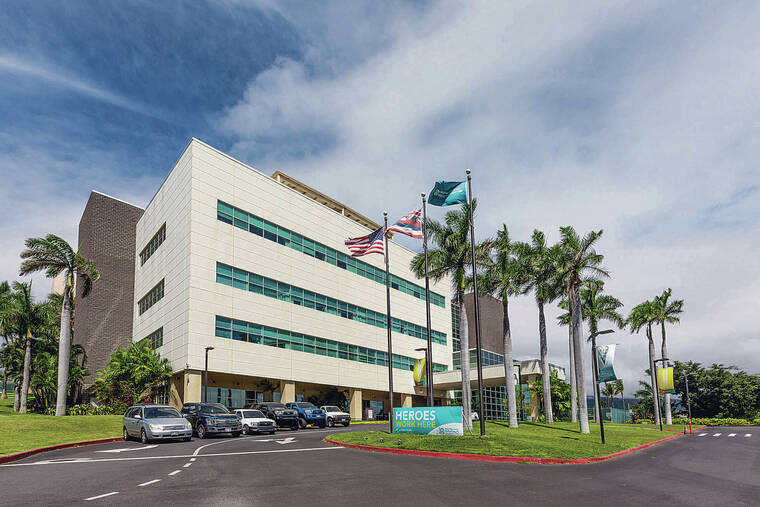Maui Memorial Medical Center and its health care affiliates in Kula and on Lanai continue to struggle
financially six years after the state turned over the cash-strapped hospital system to Kaiser Permanente in a bid to save the state tens of
millions of dollars annually.
Maui Health, which operates the Kaiser-affiliated hospital system, says that the COVID-19 pandemic has hindered its push toward financial self-sufficiency, but that it has still realized savings despite the
ongoing government subsidies.
“This has been a huge success for the state,” said Michael Rembis, Maui Health’s chief executive officer. In 2014, when Maui Health was still run by the state, it needed $38.3 million in government aid to shore up its budget. Rembis said that Maui Health has been able to reduce its operating costs, saving the state $69.5 million, since it took it over.
When Gov. David Ige signed the deal in 2016 to privatize Maui Health he estimated it would save the state $260 million over 10 years, at which point the hospital system is expected to be financially independent.
Rembis said that he expects Maui Health to meet that goal of being profitable in the next four years.
“You can’t go from a
$38 million loss to profitability and self-sufficiency overnight,” Rembis said. He said that Maui Health’s request for operating funds from the state has gone down every year.
While Kaiser had record profits Opens in a new tab in 2021, bringing in $8.1 billion in net income, Rembis said that Maui Health couldn’t depend
on the company for its own financial solvency.
“We are not a Kaiser hospital, we are a community
hospital affiliated with Kaiser,” Rembis said. He said that Kaiser’s role with Maui Health was mainly in improving its quality of care, providing technical support, including help with electronic patient records, and lending its purchasing power to help with cost savings.
State lawmakers anticipated having to subsidize Maui Health after the transfer. In the 2015 legislation authorizing the privatization, they capped annual operating subsidies at $38 million, based on the 2014 state
subsidy level.
Still, the ongoing financial support for a hospital system that is now private is irking some. “I don’t think it’s right,” said Rep. Tina Wildberger, who sits on the House Finance Committee and represents South Maui. “They just keep funneling money to them with zero
accountability of how they run the hospital.”
The state has provided Maui Health with more than $100 million in various types of funding since its transfer to Kaiser in 2017. This year, Hawaii lawmakers are set to give the hospital an additional $8.9 million in operating funds for the upcoming fiscal year that begins July 1 and as much as $23.8 million in capital
improvement funds, a
record amount.
In the 2018 fiscal year, the state provided Maui Health with $33.4 million for operations. It received an additional $30.6 million for employee separation benefits, $3 million in working capital and $6 million in capital improvement funds for facility repairs, renovations and upgrades. Over the next three fiscal years, Maui Health received an additional $78.4 million in operating subsidies and about $20 million in capital improvement funds.
Maui Health didn’t receive a state subsidy for the 2022 fiscal year. But its budget has been supplemented by $29.6 million in federal pandemic funding, according to data Opens in a new tab maintained by the U.S. Centers for Disease Control and Prevention. Ige announced in January that Maui Health would also receive $11 million in federal American Rescue Plan Act funds.
Maui Health officials couldn’t say whether this accounted for the total amount in federal pandemic relief funds that it has received, saying that its chief financial officer was on vacation and not available. The pandemic subsidies were typical for hospitals throughout the country.
Overall, Maui Health has received at least $170 million in government assistance since the 2017 transfer. In addition to Maui Memorial Medical Center, the county’s acute care
hospital, the hospital system includes Kula Hospital, Lanai Community Hospital, a Maui Memorial outpatient clinic and Kula Clinic.
Lawmakers are now poised to give final approval of the state budget for the next fiscal year. In addition to the $8.9 million in operating funds in the proposed budget, there is an additional
$9 million in capital funds to go toward facility upgrades and other improvements.
The budget also includes $14.8 million in capital funds, a portion of which could be used by the state to purchase a parcel of land that
includes The Maui News offices, and lease it back to Maui Health. The county is currently in negotiations to purchase the property.
Sen. Gil Keith-Agaran, who as vice chair of the Senate Ways and Means Committee oversees the capital improvement budget, said that the state could then purchase the property from the county. If that deal doesn’t go through, he said that Maui Health could use the money for other projects. Maui Health has said that some of its most pressing needs are creating a parking structure and creating physician offices, to help attract doctors.
“This is the only acute care hospital serving Maui County,” said Keith-Agaran, who represents Central Maui. “It is important to keep the hospital in operation and having physician offices is important for its continued viability.”

